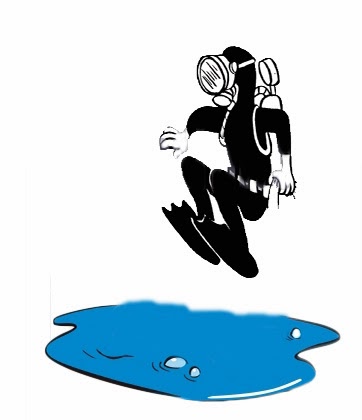
Now, those of you who know me well, will know that my opinion, buoyancy in Scuba Diving is the most basic but important skill a diver can master, regardless of you certification level. These news reports got me to thinking about Archimedes principle itself and how, understanding the concept of why things float or sink should be the very first stepping stone on the path to perfecting this skill.
ARCHIMEDES PRINCIPLE
So, what is Archimedes Principle?
"An object wholly or partially immersed in liquid is buoyed up by a force equal to the weight of liquid it displaces!"
We have all heard of the downward force of Gravity (if nothing else, it was a hit movie this year with Sandra Bullock and George Clooney). If you drop something from your hand, gravity will pull it down to the earth.
When you have an object in a liquid, things change slightly as there is also an upward force acting on the object, which is affected by the amount of the liquid displaced by the object in it.
 |
| http://www.ealconsult.com/blog/ |
On this basis, our amphibious houses will be designed (through volume and surface area and many other things) to allow them to displace their own weight in water before they sit too low in it, so they will float and flooding is prevented, as demonstrated in the image to the left.
We are Divers... How does this affect us?
Scuba Divers aim to be neutrally buoyant in the water (reasons for which, we will look at in a future blog). We do not want to float at the surface (that is glorified Snorkelling) or be bouncing along the bottom, but gliding effortlessly mid-water.
The Equipment that we use for Diving, although it can feel quite heavy, actually makes us positively buoyant in the water, so generally, we float at the surface. To remedy this, we add lead weights to the kit to allow us to sink. The trick, is to only add enough weight to keep us neutrally buoyant.
So, let's say we get into the water with all the diving equipment and we weigh 100kgs. This means that we need to displace 100kgs of water. At this point, we will be neutrally buoyant.
If we have too little lead weights, we will displace too much water for our weight and we float.
Add too much weight to our kit and we do not displace enough water and we sink, so we are bouncing along the bottom or have to overuse our Buoyancy control devices to try to become neutral. Read more about weighting for scuba diving in weighting for scuba diving in this article.
As a note, you will find that you float a bit more at the end of a dive than at the start. This is because the cylinder of air on your back will now be lighter because you have used some or most of the air in it. This means you are lighter, you displace more water for your weight and can start to float. So, when you are setting your weight, you do want to account for this change at the end of a dive.
Your instructor should be able to help you do this correctly!
So, the very basics of achieving great buoyancy comes from understanding Archimedes principle and applying it to your diving. There are a few other aspects that affect buoyancy and we will follow on with these over the next few weeks so stay tuned.















